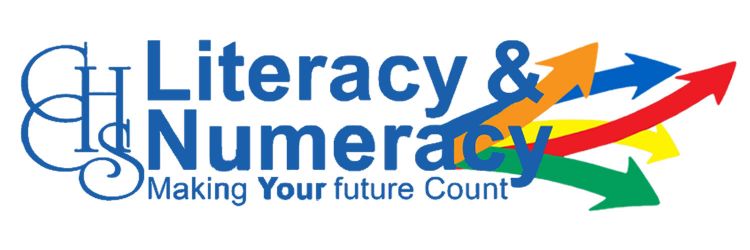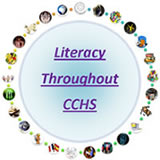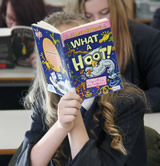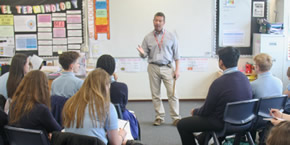
Literacy across the Curriculum
Literacy Mission statement
 "Raising the standards of Literacy across the curriculum is the responsibility of all, to ensure the future successes of all students."
"Raising the standards of Literacy across the curriculum is the responsibility of all, to ensure the future successes of all students."
Clacton County High School is committed to raising the standards of literacy for all of its students. We are dedicated to successfully delivering an effective literacy programme in all areas of the curriculum, as this is essential to the progress and future successes of our students both in and out of the school setting. High levels of spoken language, reading, writing and vocabulary are fundamental to the achievement of a rich and fulfilling life. Pupils have a right to be competent readers, writers and communicators in order to reach academic potential and be successful in life.
Reading, Writing and Communication are an embedded aspect of how we learn well at Clacton County High School and all staff and students have a responsibility to develop these life skills in others.
All staff contribute to this in their daily teaching and learning, and students can expect to be exposed to effective teaching and reinforcement of these skills around the school.
Take a look at the Literacy Newsletter 'Take-Over'....
'Reader to Leader' - Form Time Reading Programme
 Each of our form groups has been issued a form group library, managed by their own nominated reading representative. At least two tutor sessions per week are allocated to reading. Students across all year groups read a text of their choice to help them develop vocabulary, reading and comprehension skills, as well as helping enhance leadership skills.
Each of our form groups has been issued a form group library, managed by their own nominated reading representative. At least two tutor sessions per week are allocated to reading. Students across all year groups read a text of their choice to help them develop vocabulary, reading and comprehension skills, as well as helping enhance leadership skills.
Our Reading Representatives are recording reading in tutor times, those students who are leading the reading league tables in each year group are entered into a prize draw at the end of each term. These leading students will become reading representatives, who will in turn support other students across the school with their reading.
 In addition, any student who is seen reading of their own accord, in or around school, is rewarded 25 achievement points - they could be reading at break or lunch in the corridors, on the school field, in the library or Clouds. This initative is linked to the Reader to Leader Programme to help promote reading to enhance literacy skills such as reading, comprehension and vocabulary.
In addition, any student who is seen reading of their own accord, in or around school, is rewarded 25 achievement points - they could be reading at break or lunch in the corridors, on the school field, in the library or Clouds. This initative is linked to the Reader to Leader Programme to help promote reading to enhance literacy skills such as reading, comprehension and vocabulary.
'Reader to Leader' - Reader Mentoring Programme
So Why Read?
• 1 in 7 (14.9% / 5.1 million) adults in England struggle to read.
• 15.9% of all 16 to 24 year-olds are not in education, employment or training; Literacy is a big factor in this.
• 10 to 16 year-olds who read for pleasure, do better at school.
• Reading books is the only out-of-school activity for 16-year-olds demonstrably linked to securing managerial or professional jobs.
• There is overwhelming evidence that reading and understanding texts has a significant relationship to people’s life chances.
KS3 Grammar, Punctuation and Spelling (GPS)
Raising the standards of extended written communication is a key focus of our whole-school literacy programme. Recent changes to exam specifications and qualifications mean that there is now a growing focus on students being able to demonstrate excellent knowledge of grammar, punctuation and spelling (GPS). In order for students to improve their GPS and thereby enhance the quality of extended writing across all areas of the curriculum, students at Clacton County High School have a GPS focus every half term which is explored, explained and applied in English lessons in a variety of contexts. In addition, KS3 students are set weekly word-lists that are a mixture of words pupils frequently use in their writing and those which they often misspell.
Literacy in Action - Oracy & Public Speaking
Jack Petchey Speak Out Challenge
 Each year a group of Year 10 students participated in a Speak Out Challenge run by the Jack Petchey Foundation. The students use the skills they had acquired during the day of workshops to deliver a presentation that they had prepared. Students are encouraged, not only to stand up and speak in front of their peers, but to also consider their body language, changing tone and facial expressions whilst doing so. Each year our students astound their peers with the difficult and personal topics that they tackle.
Each year a group of Year 10 students participated in a Speak Out Challenge run by the Jack Petchey Foundation. The students use the skills they had acquired during the day of workshops to deliver a presentation that they had prepared. Students are encouraged, not only to stand up and speak in front of their peers, but to also consider their body language, changing tone and facial expressions whilst doing so. Each year our students astound their peers with the difficult and personal topics that they tackle.
